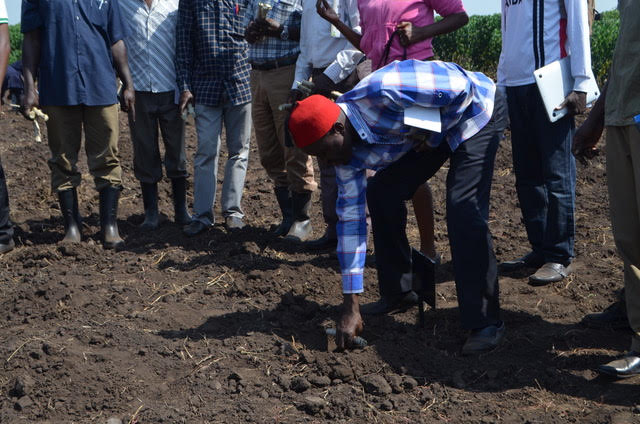
Political and farm leaders in Uganda s western district of Kasese are asking for the region to be prioritized when genetically engineered (GE) cassava and maize crops are deregulated and approved for commercial use.
Residents of the Kasese district are already facing shortages of cassava, a staple food source, due to damage inflicted by cassava viruses, leaders said. As a result, many families are eating just one meal a day.
The district leaders are the latest to join members of the National Farmers Forum on Agricultural Biotechnology (NAFFAB) and executives of the umbrella Uganda National Farmers Federation (UNFFE) in calling on government agencies to make GE crop technology available to farmers to alleviate the current suffering across the nation, especially the adverse climate change impacts that have compounded drought, disease and pest infestations.
The district hosts one of the largest and oldest Confined Field Trial (CFT) sites in the country. Uganda s apex agro-research body, the (NARO), operates a double-project CFT site there. One is for the Water Efficient Maize for Africa (WEMA) project, which is developing conventional and transgenic maize tolerant to drought and resistant to stem-borer pests, and the other is for the Virus Resistant Cassava for Africa (VIRCA) Plus project. The CFT was first established in 2010 as a purely WEMA site, with a VIRCA Plus trial added in 2016 to test the crop s resistance to Cassava Mosaic Disease (CMD) and Cassava Brown Streak Disease (CBSD). The projects are funded by the Bill & Melinda Gates Foundation (BMGF) and other partners.
Kasese District Vice Chairman Elly Masereka Magwara, accompanied by District Speaker Godfrey Bwambale Bwerere, led the call for their district to be prioritized when they participated in the late December planting of a CBSD-resistant GE cassava trial in the CFT, just below the popular Rwenzori (Mountains of the Moon) range. The planting was organized by the VIRCA Plus project teams in NARO and the Science Foundation for Livelihoods and Development (SCIFODE), and overseen by regulators from the Agriculture Ministry and the National Biosafety Committee (NBC).
Our district should be a priority to receive the GM (genetically modified) cassava and maize, because currently our communities do not have enough cassava for food mainly due to heavy CBSD infestation, yet it is our major staple, Magwara said. In addition, we are currently the hosts of these crops’ research, and as leaders, we have been involved in the research process. We re expecting the best in terms of resistant cassava crops derived from our farmer-preferred varieties.
Magwara was speaking at the CFT shortly after taking part in planting a trial the second in a series. The District leader revealed that besides serving as food popularly known as obundu, a meal made from cassava flour the cassava plant s leaves also called sombe are eaten as vegetables. This is the case even in the neighboring Democratic Republic of Congo (DRC), where communities share many commonalities (climate, landscape, language, food, dance, music, etc.) with those of Kasese.
Gideon Sanyu Ntabose, district secretary for production and marketing, and Michael Bagonza, chairman of the local Abasaijja Kweyamba Mubuku Farmers Cooperative Society, also participated in the CFT planting.
Bagonza, whose organization is a leading maize seed producer, emphasized that cassava brown streak disease is a very serious challenge. But he expressed optimism about the introduction of biotech crops into the country s farming system, saying they will revolutionize productivity per unit area planted. Since these crops are resistant to diseases and pests, and are tolerant to drought, then when we strictly adhere to recommended best agronomic practices, like water/moisture conservation, use of quality seed and ensure high levels of fertility, we shall witness higher yields in all the modified crops compared to non-GM, he said in an interview with the Alliance for Science at the CFT.
Currently, Bagonza said, the predominantly agricultural district bordering the sprawling DRC serves as a major source of food, fish, and even vegetables to the war-wrecked DRC. But our cassava is seriously infested with CMD and CBSD, while maize suffers stem-borers and drought, besides lethal maize necrosis (MLN), viral and fungal leaf infections, he noted.
Julius Baluku, the Kasese district production officer, had earlier informed NARO and SCIFODE researchers that Kasese currently produces only 30 percent of its cassava requirements, while 70 percent is supplied from outside the district.
Johnson Mwesige Sabuni, the senior agricultural officer, confirmed that CMD and CBSD are rampant in the largely mountainous, heavily-populated and highly turbulent district. CMD invaded us in the 1990s, but has been kept in check by the tolerant NASE (Namulonge Series) and TME (Tropical Manihot Esculenta) varieties that NARO releases almost annually. CBSD invaded Kasese three years ago, with devastating effects on the cassava crop. Most families eat only one meal a day, because of cassava shortages, said Sabuni, a scientist and highly-experienced agro-technocrat.
The viruses present a significant threat to the food security of East and Central Africa. Though the diseases affect all parts of the cassava plant, they are particularly devastating to the roots, which are stored for future use, making them unsuitable for consumption. Although CBSD has been recognized in coastal East Africa since the 1930s, outbreaks recently occurred in higher altitude areas of the Great Lakes region.
Sabuni was reluctant to describe Kasese as a food insecure district. But he admitted that people depend heavily on cassava as a food source. When supplies dwindle as is the case currently, and the expected trend for the future the district will become food-insecure unless there is a robust, comprehensive intervention to use virus-resistant GE seeds.
In October 2017, Uganda s Parliament approved a national biosafety law to regulate and permit release of GE crop technologies. However, it still awaits the signature of President Museveni, who recently expressed concerns about some language in the bill, prompting a review by Parliament.
